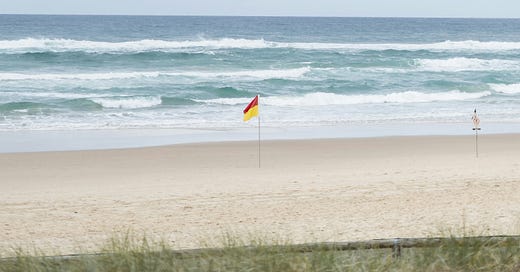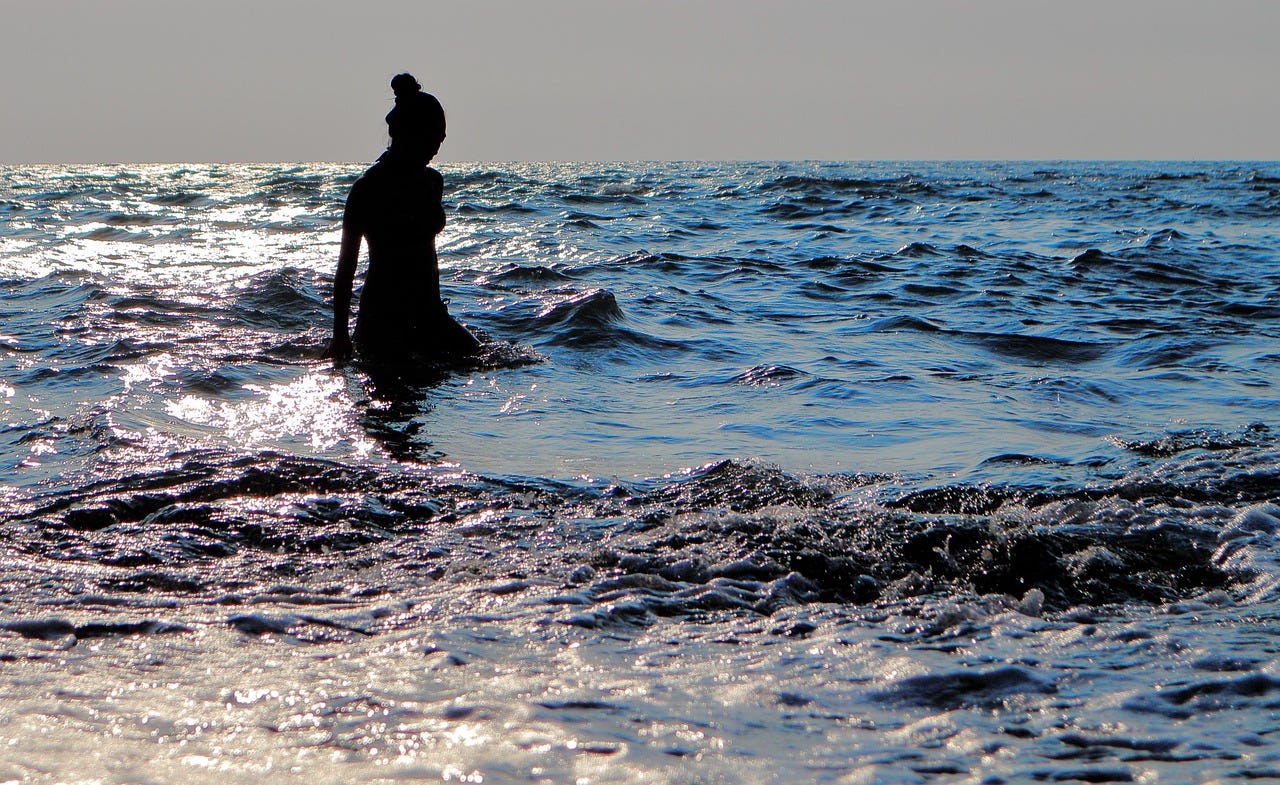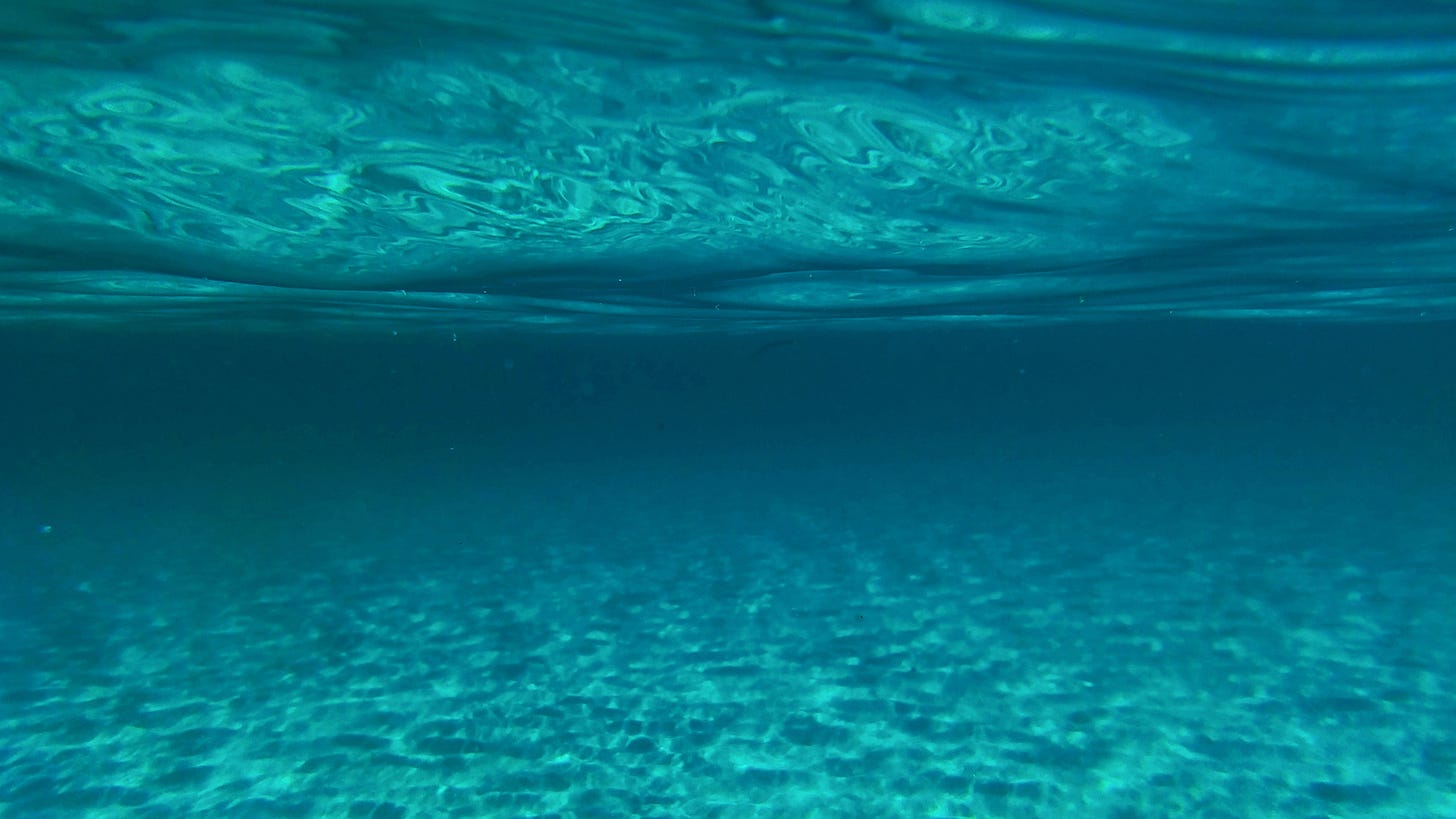"For whatever we lose (like a you or a me), it's always ourselves we find in the sea."
— E. E. Cummings
It makes me grin when people refer to ocean swimming as ‘bathing,’ which acknowledges the cleansing properties of the sea, but fails to harness a power greater than ourselves—the waves, which when heard crashing against the shore leave our spirits deeply moved. No one knows for certain why the ocean speaks so directly to us, except to say that it might be telling us that we are not alone.
My spirit recognises home when I am ocean swimming, which I have done since I was six-years-old. My body is rendered from a father who is a long-serving lifesaver, who sprang from a father before him who travelled across the Pacific, the Indian and the Southern Ocean to make new discoveries in Australia.
We gain stories by being close to the ocean, and yet, I allow the busyness of life to interrupt my once daily swimming ritual, until the morning
a nice, shaped wave calls
and my father walks along the shoreline
carrying his board
and like a dead weight he falls.
People tut, ‘Why is a man of almost eighty going surfing?’ Others whisper, ‘Imagine if he had been paddling out,’ as if he is the luckiest man in the world that fate has intervened. Two days after emergency surgery, he wakes up and the very first thing he asks the surgeon is, ‘How long ‘till I’m back in the surf, Doc?’ My sister and I are overjoyed at his recovery but it is happiness short-lived as like a bad decision his health begins to unravel. We are quickly ushered from his room—he needs rest and intervention—but why
do I leave the hospital and come to the sea?
It’s a mystery to me.
I don’t know what I am doing here, or why
So I just stand ankle-deep and alone at the water’s edge
allowing desolation to wash over me, an unavoidable part of being a human being
The wind tangles my hair, the salt leaves a gritty spray
and I hold my screams in as waves swirl inside me.
The next morning, I wake with red-rimmed eyes and wracking sobs, another awful day, but I force myself to walk to the ocean. Beneath an overcast sky and a gusty north-easterly, the water feels Siberian. Too cold to swim, I tell myself. But I don’t want to slink home with sand-covered feet only to have failed. Nobody is around, and for that I am grateful. No one to notice me or my gloomy face. I ease myself into the ocean up to my thighs, muscles taut and unyielding. Uptight, vulnerable, and shivering, I cross my arms over my chest to create a barrier between me and the pain
is what my father feels while he waits for an ambulance. Strangers gather around to reassure him that ‘everything will be okay.’ Someone places a blanket over his shoulders. My father, who just days before is full of life, hovers so close to death it seems ridiculous, like the universe has made a terrible mistake.
The next day I return and do it all again. I trust what my father says, ‘that the ocean has been our healer from a time before words.’
My teeth clamp shut as I adjust to the cold. After a minute or two, my legs have acclimatised so I wade in further. But when the sea rolls against my stomach the chill stings and I fight the urge to turn and run. Instead, I thrust my arms down by my side and with clenched fists create small, swirling eddies. A ray of sunshine funnels through a hole in the clouds, and before my thoughts can conjure an excuse, I freestyle two hundred exhausting metres as a body, not a mind. To the onlookers on the beach, I probably look like a 17th-century pirate afraid of the deep. But I have done it. I have plunged into the calm, before the storm of not always having my father overcomes me
when I think about the beachgoers who help him. They return to their homes to walk their dogs along quiet tree-lined streets or trim their startling pink bougainvillea hedges wondering what happened to that man down on the beach. Tears well as I take a final breath and let myself sink to the seabed hoping this might alleviate my struggles. Then I remember. I am a swimmer. That is what my father made me. And so, I swim.
The next day I do it all again.
A swimmer with dazzling white teeth wearing dark neoprene to trap her body heat tells me I am brave. It takes an iron will to smile before she bobs away like a seal. Only then do I cry, a deluge that strikes now whenever I’m shown the slightest kindness. I wait for her to masterfully dive clear of the breaking waves before I begin my routine. Mimicking a nudibranch, I flatten my feet and inch across the sand, overly sensitive but devoid of vivid colour. I glance back to shore, considering retreat. It feels too cold to swim, but I sense a need to conquer my cowardice so I can feel closer to my father
who is lying in an ICU bed completely exposed, his suntanned face and everlasting warmth turning pale and grey. Arranged across his body is a ventilator, tubes and wires with a machine beeping quietly behind, and a nurse in the room the entire time. Watching him fight for life is such an intimate and private thing, even though he is the one person I have loved most deeply my whole life.
The next day I do it again. The ocean acts as a sounding board for my same four desperate words—stay with me dad… stay with me dad—that ricochet around my head until they splinter like shells against the shore.
Today the water temperature feels Pacific. I walk straight in, but a young boy sprints past and dives into the waves splashing me. ‘Just do it!’ he yells. I turn away disgruntled, a parody of a sea cucumber sucking water up its backend. I inhale a great breath, stubbornly hold it in, but surrender to my soul that aches for the jolt of submersion. With little air left in my lungs, I set off in a frog stroke so that I have a reptilian view of the coastline where carefree blonde surfers and hide-skinned old folk with wide smiles sunbake, and an umbrella made with bunting from disposable dog pooh bags flutters in the wind like the destructive thoughts I flog myself with. Shame, regret and loss
that pushes me to a deeper place where danger elicits moments of respect and admiration. I swim across current back to shore. When an ocean tells you to leave it alone, you leave it alone. The same way a mountain tells you who should climb it, and a trail knows who can hike it. I leave the ocean to do its own thing which on this day is finally not to act as a vessel for my tears.
By my seventh week, the ocean has wired my brain a different way. I no longer collapse into the waves and let them toss me around like an inflatable ball but dive like a porpoise in a more positive way. Emerging from the water with tingling skin, endorphins activated and adrenaline rushing, I retrace the indented footsteps that no longer belong to me, but to a strong and compassionate sea woman with the blood of Thalassa coursing through her veins. At the hospital, I rise from my father’s bedside and tell the doctor, ‘I am taking my father home
is not recommended
the doctor says from behind a veil of dedication and fatigue
Your father has days to live, not weeks.’
With closed eyes, I imagine my head crowned with starfish and seaweed. Inhaling, not the hospital’s static air but the living ocean air that resuscitates the land and those who seek it, I say with the force of a crashing wave, ‘Tomorrow,’ knowing that the miraculous can happen and trusting that it already has.
At home, my father tilts his face towards the morning sun, his dull eyes regaining some sparkle as his gaze settles on the cerulean sea. He is listening to the slow, rhythmic heartbeat of the waves that only the initiated can hear. He asks his doctor, ‘How long before I can walk to the water
is out of the question,’ the doctor says. ‘And you will never surf again.’
‘Then I will swim,’ my father says.
‘You won’t be strong enough to walk across the dunes,’
‘Then I will crawl,’ my father adds.
One day, the members from the Miami surf club put my father into an all-terrain vehicle so he can cross the sand to the water’s edge. Afterwards, I ask my father if he would like to move from his coastal home to live out the rest of his life with either of his daughters. ‘No,’ he says without a moment’s hesitation, ‘I am staying where I can hear the waves.’ And at last, I understand all that my father knows but never says.
If we truly belong to a place, which for him is a turbulent blue-green underworld, nothing can really undo us.






